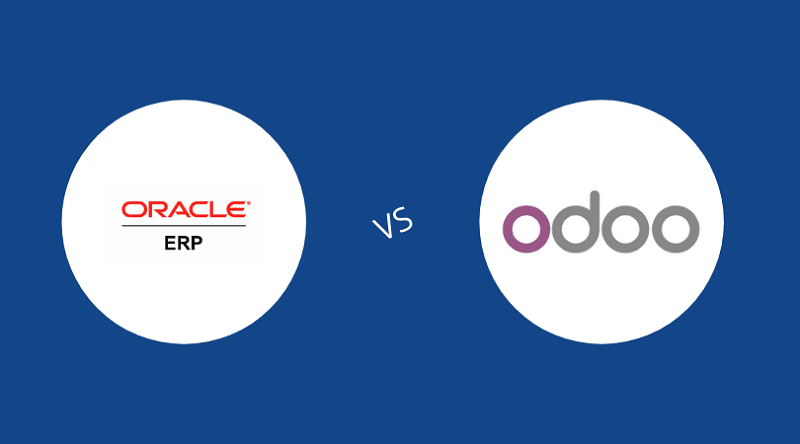Related Articles
Business software offers many more features than just enterprise resource planning (ERP). Such progress is due to the growing number of regularly released packages. Today, many cloud-based ERP programs that can manage all areas of your business, from the production process and stock balances to sales and marketing.
Among a large number of ERP software products on the market, there are several leaders. In the early days, SAP controlled the enterprise software market, offering high-quality software products. Over time, this platform began to lose its leading position due to the appearance on the market of open-source products. Oracle vs Odoo which one is better?
Speaking about ERP solutions, we can distinguish several of the most successful names in the business today – Oracle, SAP, and Odoo.
Such software is developed by computer technology companies that offer cloud systems and enterprise software products with a large set of functions. Additionally, any of these programs allow you to manage logistics and finance.
Oracle vs Odoo
We will be discussing Odoo and Oracle, and how one stacks up against the other – and, to be quite frank, if there is a comparison to be made between these ERP solutions. So, which of these 2 popular solutions should you use for your enterprise? Oracle vs Odoo which on is better to use.
Let’s first try to figure out by comparing these software packages to help you make the right decision. Because ERP is, after all, a huge investment of time, bother, and resources for firms who are looking to use it to become more competitive in today’s business climate.

What to Look For in an ERP Solution
The first thing you always pay attention to when choosing ERP software is its functionality. What makes Oracle special is that it is designed for enterprise software. This means that it must be coupled with every business system and process in the enterprise. To give you a better idea of which software to use, the characteristics of Odoo and Oracle are described below.
What Does Odoo Offer?
Odoo ERP is a fairly popular enterprise software that many useful features:
- An all-inclusive approach. Odoo is a comprehensive package of business applications in which, like SAP, there are modules for almost all functions of the organization. Odoo has over 2 million users, of which the majority are small and medium-sized enterprises. At the same time, the platform is used by several large enterprises, confirming the fact that the software is widely used in the market. Moreover, the company has 730 partners.
- No backwards compatibility. Odoo is not backward compatible (as other options like SAP do). What that means is If a new version is released, all code and data will need to be migrated. This can be quite troublesome because releases can come out quite often, and constant migration may be tedious for some organizations.
- Fewer bugs and vulnerabilities. Although Odoo, written in the Python programming language, has been on the market for many years, you may still encounter a few bugs. Developers began to fix bugs after the 8th release, so be prepared for the fact that some refinement may be required after the implementation of Odoo in the enterprise.
- Reasonable pricing plans. Compared to Oracle, Odoo comes at a more affordable price for small and medium businesses. Although you have to pay for services for each user, Odoo is not as expensive as Oracle (or conversely, other options such as SAP) in the final accounting. For example, if you need to provide work for 50 users, SAP will cost about $60,000 for a year, while for the same agreements, Odoo will cost about $ 15,000. That’s a LOT in cost-savings.
What Does Oracle Offer?
Now for Oracle. Its distinctive features will be important for you when choosing software for your organization:
- Convenient Database Management System. Oracle RDBMS is based on a multi-model structure. User-friendly RDBMS, developed and sold by Oracle, can be used for various purposes and tasks, such as data storage, online transactions, and many others. The Oracle database specializes in handling large application loads and massive amounts of data.
- Scalability. Oracle offers a wide range of tools and technologies that scale the database. Moreover, there are plenty of useful tools, utilities, and features that come with the server for your work.
- Simple and clear. When using Oracle, some might think that it is very difficult and incomprehensible. However, the design of Oracle DBMS is made so that it is very easy to cope with any difficulties. Another important advantage is that the software is available for different operating system platforms with the same code base and documentation. No matter which operating system platform your company uses, this software can be quickly and easily integrated.
- Cost-effectiveness. The cost of implementing Oracle is even lower compared to Odoo. No matter which operating system you use, this ERP and database management software can be implemented throughout your organization without sacrificing your budget.
- Systematic Bug Fixes. Due to its global use and widespread market demand, Oracle performs well and does not have many bugs. The developers constantly worked hard to ensure that the software was the best and offered companies excellent value for money.
- Limited functionality. If you are looking for a complete solution, Oracle may not be suitable for your enterprise. However, if you need database management software, you certainly won’t find anything better than Oracle.
Odoo vs Oracle: Head-to-Head
If you need $20 a month to use Odoo, then you need to pay $75 a month to work with Oracle. At the same time, Odoo provides all the necessary functions:
- Enterprise Asset Management
- Financial management
- Personnel Management
- Customer Relationship Management
- Order management
- Distribution Management
- Project management
- Inventory Management
- Analytics
- Reporting
Oracle, on the other hand, does not provide Distribution Management, Personnel management, Customer Relationship Management, and Warehouse Management.
Regarding the use of Odoo and Oracle for various platforms, while Oracle is only compatible with the cloud, Odoo is compatible with Windows, Mac, cloud, and works on Android and iOS mobile devices.
Odoo offers its services in different languages:
- English
- German
- Chinese
- Japanese
- Hindi
- French
- Spanish
- Russian
- Italian
- Dutch
- Swedish and others.
Meanwhile, Oracle is available in English only.
Odoo offers several dozen applications through the Enterprise platform, while a community of about 25 thousand active participants contributed more than 17,000 applications for the open-source software version, practically designed for a wider range of needs.
It focuses on the business application segment for small and medium-sized businesses. The main concourses of Odoo are SAP, Oracle, OpenERP, and Zoho. At the moment, according to the statement of the owners, it has more than 4.6 million users worldwide and this number is constantly growing.
Odoo is here to stay
Odoo is a profitable project and it is growing at 60% per year from 82.98% of gross profit margin.
And we firmly believe that it is here to stay.
It will be here and it will be around for a long time, and it will continue to excel in what it does best – creating all-in-one business software that offers an open-source version as well as subscription-based enterprise software and SaaS.
This, considering the fact that it has been able to raise $90 million in 2019 thanks to new investors (most notably international VC firm Summit Partners), who have raised said funds via a secondary share sale. Odoo’s executive management team and existing investors have also bought stock.
These fresh funds from the capital increase will be used to further drive product development initiatives, which are crucial for Odoo’s plans to continue expanding its reach all over the world.
Odoo’s newfound capital increase positions them for long-term success, and represents the strength of their product offering. Odoo will be a force to be reckoned with in the future.
Therefore, according to forecasts, it will exist as a successful project for a long time and will continue to excel in what he does. The main goal of the company is to create universal business software that offers an open-source version and enterprise software that is subscription-based.
The attracted investments allowed the company to develop and improve its product, expanding its functionality to the level that we have today.
Conclusion
For enterprises that require global database management software, Oracle RDBMS is the best option on the market today. If you need such software at a better price, and you can make some changes, configurations, or settings, Odoo can offer you excellent value for money.
Based on extensive experience, we can confidently say that traditional ERPs are expensive and, as a rule, do not adapt to the unique needs of a single enterprise to the full extent without certain manipulations. However, thanks to a flexible set of applications and relentless attention to the product from the public and developers, Odoo can take advantage of this great and attractive opportunity that has emerged on the market for enterprise software today.
In any case, it is up to you to decide which software is ideal for your business environment. Each software has a different meaning and is by no means superior to the others to a large extent.
Depending on their functionality, some may have a slight advantage over others in some niches and individual situations.




